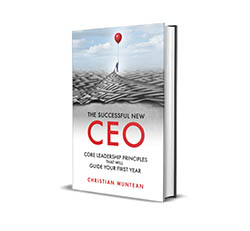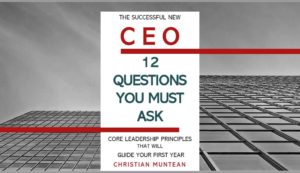Why Organizations Need to Define Their Philosophy of Leadership
In my role as a consultant, I’m often called upon to help leadership teams relate well and make effective decisions.

Often comments will include phrases like, “Well, this is my leadership style.” Or, we have different “leadership values.”
Every leader tends to feel that their way of leading is the best or right way.
If the leader isn’t getting the results they want, or a conflict has been created, the tendency is to believe that, “My leadership is fine. The other person is doing it wrong.”
There is no one way to lead.
Different people offer different kinds of leadership. Different situations need different approaches.
In fact, Situational Leadership is the whole theory of leadership that has formed around this dynamic. It proposes that “one way” of leading is limiting and counterproductive. It maps how leadership should change depending on who you lead and the situation you are in.
Organizations benefit from consistency.
Within organizations, leaders will have differences. If managed well, these differences can contribute to organizational strength.
But if leadership approaches are wildly inconsistent, it can create confusion. If leadership styles conflict with organizational values or culture, you get problems.
The solution: A clear leadership philosophy
A leadership philosophy defines the core values, principles, and behaviors that guide all leaders in your organization. It provides needed consistency. It supports alignment between leaders. It helps anchor your organizational culture.
When people know what they can expect from leaders – they know how to relate to them more effectively.
A clear & articulate leadership philosophy is a powerful tool for building your organization.
What is a Leadership Philosophy?
Think of your leadership philosophy as the values, vision, and mission statement for leadership. The goal is not to create ‘cookie cutter’ leaders; that would be detrimental. Diversity in strength, perspectives, and style is valuable.
However, unguided diversity creates confusion and conflict. A leadership philosophy provides guidance through common values, goals, and approaches.
Here are two examples:
Example 1: “Our leadership approach is one of consultative leadership. The leader is ultimately responsible for whatever is under his or her authority – but is expected to actively pursue & consider the input of others in decision-making. We expect our leaders to have internalized our mission in such a way that they can adapt plans and processes, as needed while staying true to the mission & values of our organization. We expect them to instill the values & mission in those they lead. Our leaders serve with integrity, professionalism, compassion, and humility.”
Example 2: “We thrive in a fast-paced, competitive, and rapidly-changing environment. We are creative, adaptive problem-solvers who quickly respond to the needs of today while building a stronger future. We value and rely on integrity, self-direction, and high communication. We influence those around us by example – we lead the way – we don’t direct from the rear. We are tolerant of differences and respectfully offer and receive challenges on the status quo, assumptions, and ideas for the purpose of creating smarter leaders, and accomplishing our mission.”
Both approaches allow for various styles of leadership. Both of these organizations may be ‘high-performing’ organizations. But they may have very different cultures and expectations about how to succeed. Neither is more “right” than the other.
In the first example, the leader will likely consult with those around him before making a decision. This practice may create a culture that emphasizes relationships within the organization.
In the second example, the leader is expected to make good decisions on the fly – and be open to push-back from those around her. This practice may also create a culture that is very accomplishment-oriented.
Both cultures come with their own pros and cons. Neither is necessarily healthier or better than the other.
What Leadership Philosophy Isn’t
A leadership philosophy isn’t a job description. It doesn’t describe the scope of authority for each position, how decisions are made, or specific responsibilities.
Supervisors of entry-level staff will need to exercise a different style of leadership than team leaders for highly trained professionals. Long-range planning will require different leadership approaches than emergency response.
Nevertheless, the leadership philosophy provides guidance for all leadership levels and situations. It shapes the culture of the organization.
The Value of a Leadership Philosophy
A philosophy of leadership provides guidance in a number of key areas:
- Recruitment: It is a powerful recruitment tool. If publicly stated, it will automatically help screen people who do or don’t identify with your leadership philosophy. It also provides a lens for recruitment – you know what you are looking for in a leader.
- Management: Describing leadership helps you guide your leaders. Leadership philosophies provide a common language for managing leadership performance.
- Growth: It provides a tool for growth. When addressing issues; there is something to point to and coach from. (For example, helping a self-directed leader to navigate a collaborative culture.)
- Reduces Conflicts: Common values and approaches help leaders work together. It helps everyone know what to expect from each other.
- Culture Shaping: It shapes the sense of who we are, what we value, and how we relate.
Questions to ask when creating a Leadership Philosophy:
- What are our common values?
- What leadership behaviors best reflect these values?
- How do our leaders contribute to our success?
- What are 5 words that describe our ideal leader?
- How are decisions made?
- How do leaders grow?
- What does accountability look like?
Final thought
Even if you’ve never considered a Leadership Philosophy, you have one. So do those around you. We’ve all developed a sense or conclusions regarding how “leadership is done.”
It might be as simple (and unhelpful) as: “It’s good to be king!” or as detailed as one of the examples above.
Clarifying what is expected from the organization and by the staff will go a long way to improving the health of your organization.
What is your Leadership Philosophy? And, what benefits might you enjoy in discussing and defining it today?
Take good care,
Christian
In the podcast Thought Leaders Driving Returns (TLDR), I’m interviewed by host Hunter Guthrie about how important mindset is in leadership and about effecting cultural change in the face of transition. LISTEN HERE.
Are you interested in learning more about becoming a successful CEO? If so, get a free copy of my book The Successful New CEO. Not a new CEO? I’ve been told by “old hands” that they felt any CEO should read this. So, click here to get your copy today.
by “old hands” that they felt any CEO should read this. So, click here to get your copy today.
Let’s connect.
I’m passionate about helping leaders to create workplaces they love going to and increasing the value of the services they offer. My results-oriented approach is tailored to each client’s specific situation and needs. As a leadership coach, I have developed a wealth of resources to help you and your team grow and become stronger.
Weekly Newsletter – sign up to receive my weekly articles addressing critical leadership challenges and issues.
The Leadership Coach Podcast – In my podcast, we explore effective, high-impact, and enjoyable leadership. Subscribe.
Resources – Visit my website’s Resources page for e-books, webinars, training, and leadership coaching opportunities for you and your team.
There are 𝟭𝟮 𝗰𝗿𝗶𝘁𝗶𝗰𝗮𝗹 𝗾𝘂𝗲𝘀𝘁𝗶𝗼𝗻𝘀 to ask before accepting a new CEO position. Do you know what they are? Instantly download my free e-book here.
Find the value of your company with my free assessment tool: The Value Builder System
The Value Builder System™ is a 13-minute online questionnaire that evaluates your business on the eight factors that contribute more to its attractiveness and value. These factors are scored on a scale of 1-100. Businesses that score over 80 are likely to command 70%-100% higher value than others.
Opportunities
Free Resource: How To Accomplish More Without Doing More is a workbook I created to walk leaders through a process of helping you own your calendar, liberate your time, and still get more done. Download it for free!
Executive and Leadership Coaching: Do you feel overwhelmed? Are you not getting the results you expect from the effort you are putting in? Do you find yourself facing similar challenges time and time again? Would you like to change specific ways of relating or reacting? If you would like to experience predictable, measurable growth Contact me.
Profitable Exit Strategy Workshop: Are you a business owner or partner? Over 55? Starting to think about exiting your business or active management in the next 3-5 years?
- Curious about what your business might be worth?
- Would you like to discover the specific steps you need to take to increase its value and become highly attractive to a buyer?
- Are you planning on handing it over to family or employees and you want to ensure long-term success?
If so, contact me now
Article Categories
Popular articles

Download my free 10-page eBook:
How To Accomplish More Without Doing More:
Eight Proven Strategies To Change Your Life
Discover how to save eight hours during your workweek-even if you're too busy to even think about it. The resource every maxed out executive needs.

